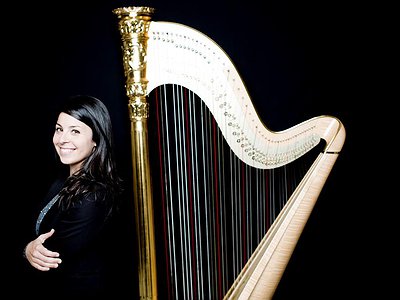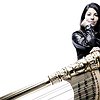With more and more musicians creating than ever, what does this mean for you as an artist in terms of originality? What are some of the areas where you currently see the greatest potential for originality and who are some of the artists and communities that you find inspiring in this regard?
It’s definitely effective to be creative and innovative in your field. I personally find that it’s not always easy to “re-invent” my own instrument as for ages the harp has been known as a soft-angel-like instrument and it’s often pushed back into a cliché-corner. Therefore I really try to exhibit the harp in different ways and push boundaries. Living in a world that has become “a village”, I think it’s beautiful to mix different cultures and musical styles to create a new image.
For quite a long time, improvisation was an integral part of what we now refer to as 'classical music'. Over the course of the 20th century, there have been various attempts at reviving that tradition. How much room for improvisation is there within your own approach and how do you approach it?
It’s true that improvisation has largely disappeared. To think that musicians were able to improvise their cadenzas in concertos like Mozart’s! This doesn’t happen anymore. Of course we write out our own cadenzas now and I personally try to do this too, but it’s true that nowadays it doesn’t happen in a spontaneous way. Other than that I still like to improvise for myself at home, to stay creative and get ideas for possible compositions.
Recordings have always been a hotly debated subject in classical music. In your opinion, what are some of the quality criteria for a good recording, what role can technology play and in how does a recording allow you to approach a piece from an entirely different perspective?
Well so far I have made four recordings and I can only say that a recording captures a moment or a phase in life. Listening to some of my recordings from years ago, I know I would play many things differently now, as I have developed personally, gained experience in life and music. All of these things influence our playing. One can only try to express what seems to be the right way at the moment of the recording. Of course I’m happy that technology can do so much for sound quality these days, but I’m personally not a big fan of cutting and pasting too much. By trying to make something perfect, one risks losing emotion and self-expression.
What constitutes a good live performance in your opinion? What’s your approach to performing on stage?
Well, my answer is quite simple: a performance has been successful for me if I was able to be completely free to express my emotions and if this came across to the audience. If people come up to me afterwards and tell me that they were moved by my performance, I’m happy.
As Charles Rosen put it, “the death of classical music is perhaps its oldest continuing tradition”. From your perspective, what are some of the root issues for what is generally referred to as the “crisis of classical music” and what, to you, are sensible ideas for improving it?
Well the main cliché is that classical music is only for an “elite” and select public. Many people that haven’t grown up in a classical environment are perhaps afraid to take the step to a concert hall/the unknown. It’s important is to reach out to everyone, in order to make it approachable. At the Vienna Philharmonic New Year’s concert, I was aware of another audience, which is “curious” to come and listen. The orchestra is of course widely famous –not only among classical fans. Usually they are positively surprised about their experience and wonder why they hadn’t tried it before. That’s why we should really try to make classical music “open to everyone”. At least to give everyone a chance to try it, then people can still decide whether to “stay” or not.
What's your view on the role and function of music and artists in terms of political/social/creative responsibilities and how do you try to meet these goals in your work?
Artists can attract many people and large audiences, so it’s our duty to use this advantage to reach out to people in order to promote good causes. I play for many charity concerts for example. Apart from that I think it’s important to give people an “escape” from their daily life and let them be in touch with something honest and pure.
Reaching audiences usually involves reaching out to the press and possibly working with a PR company. What's your perspective on the promo system? In what ways do music journalism and PR companies change the way music is perceived by the public?
It’s very true that today the media plays an ever greater role in classical music and I think it has advantages and disadvantages. In a way of course, it’s good to have a wider reach and to provide easier access. On the other hand however there is the danger that the quality of the product (concert/artist/music) becomes secondary to good promo material and that’s what I’m afraid of. People are increasingly interested in a beautiful cover rather then what is behind it.
Do you have a musical vision that you haven't been able to realise for technical or financial reasons – or an idea of what music itself could be beyond its current form?
For me personally it’s my dream to devote more time to composing. I love performing but I’m traveling and playing so much that I barely get the chance to read, study and be creative. This might be a “technical” disadvantage of trying to realise the many things that I love. I hope one day I will find a better balance and be able to realise all my passions.



